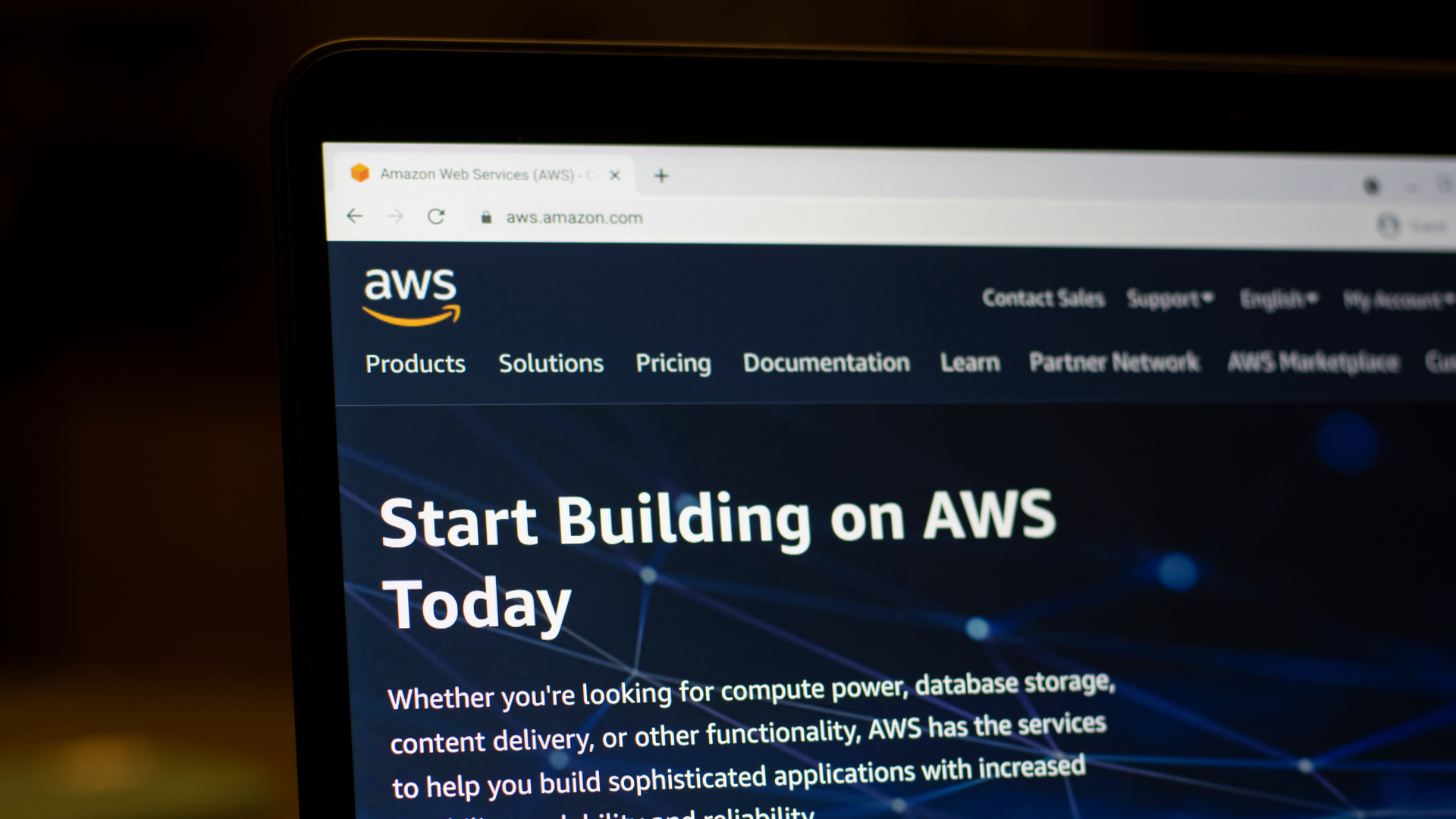What is AWS hosting?
In this article, we look at what AWS hosting is and how it's long been an integral part of the internet


What is Amazon Web Services (AWS)?
Amazon Web Services (AWS) is the world's most-adopted cloud platform; it is made up of over 200 different cloud data services using data centers around the world. AWS has three main products: EC2, Glacier (a virtual machine service), and S3, Amazon’s low-cost storage system. AWS accounts for about 13% of Amazon's total revenue and is used by companies such as Netflix, LinkedIn, and Facebook/Meta.
AWS: an introduction
Amazon Web Services (AWS) is something you’re not necessarily aware of; not everyone knows just how important it is to the modern internet.
Most of the best web hosting services rely on AWS in at least some capacity, and many of them are essentially just resellers of AWS services. In this article, we’ll look at what AWS is and take a more focused look at AWS hosting, one of the types of services AWS offers.
What is cloud computing?

Early internet services essentially ran on standalone servers. Remote computers would directly contact a single server to request a webpage, for example. But this type of system scaled poorly, with servers often overloading if many people tried to use a service all at once.
The technology quickly evolved into server farms, where the load is balanced across multiple servers, allowing for more concurrent users. A single company running its own server farm can be said to be running a private cloud, with the best cloud storage and the best cloud hosting just two areas where cloud computing is utilised in this way.
Cloud computing platforms like Amazon Web Services, Microsoft Azure, and Google Cloud are public clouds. They too have massive server farms and data centers, but they offer a way for individuals, businesses, and even governments to rent a small share of these resources on a pay-as-you-go basis. Public cloud computing platforms are often referred to collectively as “the cloud”.
What are the advantages of using cloud computing?
Cloud computing offers some incredible advantages to businesses.
Get the ITPro daily newsletter
Sign up today and you will receive a free copy of our Future Focus 2025 report - the leading guidance on AI, cybersecurity and other IT challenges as per 700+ senior executives
- It's significantly cheaper than building and maintaining server farms of your own
- You can deploy applications quickly
- It’s easy to scale up (and down) as your needs grow
- There is high reliability, thanks to the massive infrastructure
- You can leverage pre-existing systems for backups, databases, virtualisation, etc., instead of re-inventing the wheel
- You don’t have to worry about how it works behind the scenes
More on Amazon Web Services (AWS)

AWS is Amazon’s cloud computing platform, and the largest cloud infrastructure in the world. Canalys reports AWS made up 32% of worldwide cloud infrastructure in Q1 2021, with Microsoft Azure and Google Cloud making up 19% and 7% each, respectively.
AWS is a sprawling, complex mix of over 200 separate services. For example, Amazon S3 is the main AWS service for storing, uploading, and retrieving data. It’s very versatile, but the most popular use of S3 is in the scalable, low-cost, high-speed storage of files.
Amazon EC2 provides scalable computing. You can use EC2 to create virtual servers according to your requirements or run large-scale computations on your company��s data.
Another popular AWS service is Amazon Glacier, which is an online web storage service for the long-term archival of data. With Glacier, you can store information for months, years, or even decades, all at a super-low cost.
Many of the web’s big hitters use AWS services, including Netflix, LinkedIn, Facebook, Twitter, Baidu, Reddit, and Adobe.
What is AWS hosting?
When we discuss hosting, we typically mean website hosting. But while this is certainly something that AWS can do, it’s worth noting that AWS also offers other types of hosting.
Application hosting, for instance, is when you leverage AWS’s many services to create an application. You can then use that application in your business or sell it as a service to other companies through a Software-as-a-Service (SaaS) model.
If you have many large files, you might also consider file hosting on AWS to lower data transfer and storage costs. Or you can use database hosting on AWS for just your company’s databases if you need to be able to access them globally, for example.
There are also other types of hosting available through AWS. For instance, Amazon GameLift can be used to deploy, operate, and scale cloud servers for online multiplayer gaming.
AWS for web hosting

When we drill down to web hosting in particular, AWS again offers you a wealth of options.
For super-simple, one-page, static websites, you can use AWS Amplify. It costs 12p per GB served and 0.02p per GB stored, so a web page with 10,000 users per day would cost approximately £60 a month. Amazon S3 object storage can also be used in a similar fashion to serve up static pages or files at a low cost.
Simple websites can be hosted using Amazon Lightsail, which is essentially a VPS service. Lightsail includes all the infrastructure you need to create a website capable of dealing with low–medium amounts of traffic. You get a virtual machine, SSD storage, a static IP address, DNS management, and a set amount of data transfer, all for a price starting at £2.85 a month.
If you expect to need five servers or more, you’ll need something bigger. Enterprise-level web hosting on AWS typically uses Amazon Elastic Cloud Computing (EC2). With EC2, you rent multiple web servers, usually situated in several separate data centers around the world. Coursera and Lamborghini are two examples of companies using EC2 for their web hosting infrastructure.
Cloud hosting providers that use AWS
Despite the potential advantages, most SMEs don’t host their websites directly with AWS. A business will typically go to web hosting providers like Bluehost, HostGator, Hostinger, or DreamHost. These services offer a more accessible means of building, managing, and maintaining a website.
But many of these services, under the hood, run on Amazon’s cloud infrastructure. So even when you aren’t directly buying your web services from Amazon, you are often using AWS nevertheless.
WP Engine, which provides managed WordPress hosting, is an example of a web hosting company that uses AWS for all the hosting it sells. There are also companies like Cloudways that explicitly offer managed AWS hosting, simplifying the process of using AWS for web hosting and adding a layer of technical support for end-users.
Conclusion
AWS is the largest cloud computing platform in the world, with millions of servers running in hundreds of data centers around the globe. As a public cloud provider, it offers over 200 web services that businesses can leverage on a pay-as-you-go basis.
Most often, renting services from AWS is significantly cheaper than implementing the service yourself, because of the substantial cost of the physical hardware. Other clear advantages of using cloud services include scalability and reliability.
AWS offers various hosting services. For website hosting, you can build basic sites with AWS Amplify or Amazon S3, dynamic sites with Amazon Lightsail, or enterprise-level sites with Amazon EC2.
Whether or not they explicitly mention it, many web hosting companies use large cloud computing services like AWS for some or all of their infrastructure. Through reselling, they offer easy access to the benefits of large-scale cloud computing while shielding customers from most of the complexity.
AWS, therefore, has long been a pivotal part of the internet as we know it, and looks destined to continue to be relevant for decades.
Further reading on web hosting and website builders
Check out our guide to managed vs unmanaged hosting to find out which is best suited to your needs, and discover the best VPS hosting or best cloud hosting services. If you're looking to create a new website, make sure you look over the best website builders before making your choice.
Richard brings more than 20 years of computer science, full-stack development and business operations experience to ITPro. A graduate in Computer Science and former IT support manager at Samsung, Richard has taught courses in Java, PHP and Perl, and developed software for both private businesses and state organisations. A prolific author in B2B and B2C tech, Richard has written material for Samsung, TechRadar Pro, and now ITPro.
-
 Bigger salaries, more burnout: Is the CISO role in crisis?
Bigger salaries, more burnout: Is the CISO role in crisis?In-depth CISOs are more stressed than ever before – but why is this and what can be done?
By Kate O'Flaherty Published
-
 Cheap cyber crime kits can be bought on the dark web for less than $25
Cheap cyber crime kits can be bought on the dark web for less than $25News Research from NordVPN shows phishing kits are now widely available on the dark web and via messaging apps like Telegram, and are often selling for less than $25.
By Emma Woollacott Published